INTERVIEW TIPS FROM THE INTERVIEWERS - FOR LATERAL ATTORNEYS
Practical, Real-World Job Interview Advice and Tips from Washington, D.C. Law Firm Attorneys and Recruiting Managers.

We have entered the busiest time of year for hiring a lateral attorney. Recruiters at law firms are concentrating more on hiring laterals for busy and growing practice groups and less on on-campus interviews. In addition, more lateral attorneys begin their job searches after annual reviews, bonus distributions, and promotion decisions. To help you prepare for lateral associate interviews, we thought we would share some of the best preparation activities and strategies we have found. Several studies have concluded that more interview preparation increases the chance of success in the law firm interview process.
In contrast to summer associate interviews, lateral hiring interviews are more substantive. You should be prepared to demonstrate what you have learned during your time at the firm. Your legal experience and the basic information about the group and the firm you are interviewing need to be committed to memory. You have the opportunity to tell the interviewer your professional story, not just a series of facts and answers. You should go in with an agenda: to tell the story you want to tell. At the same time, the interviewer may control the format, your message matters. Interviewers often remember enthusiasm and preparation — this article on how first-year law students can impress during summer job interviews highlights simple steps to leave a positive impression.
Recruiters can give you a real edge over other candidates when it comes to preparing for interviews. You should work with a legal recruiter from a recruiting firm, like BCG Attorney Search, throughout the lateral process. A recruiter should help you figure out how to best articulate your story, anticipate the interviewers' questions, and be prepared for any curveballs the interviewers may throw. Interview styles often differ in smaller firms, where partners play a direct role — learn what to expect in small law firm interview questions and answers. You can leverage these insights even more effectively by applying the process in Why Following BCG’s System Gets You Interviews—and Hired, which teaches you how to anticipate and meet firm expectations. Many of these subtle interviewer reactions are discussed further in the video 21 Reasons Major Law Firms Reject Candidates (and How to Stand Out Instead) — a great resource to understand why small mistakes can lead to big rejections.
PRE-INTERVIEW PREPARATION
What is the first rule of job interview preparation? You can never prepare too much...
Most of us admit we have left job interviews feeling as if our preparation was not up to snuff. And with so many things to remember before the big day, it is no wonder people can feel overwhelmed. Always prepare a pre-interview checklist to take some of the work off your shoulders. Watch Common Questions and Answers About Law Firm Interviews to see examples of how these subtle tips play out in real interviews.
- To complement these insider tips, see Cracking the Code of Law Firm Interviews: Strategies for Success for a structured approach to interviews.
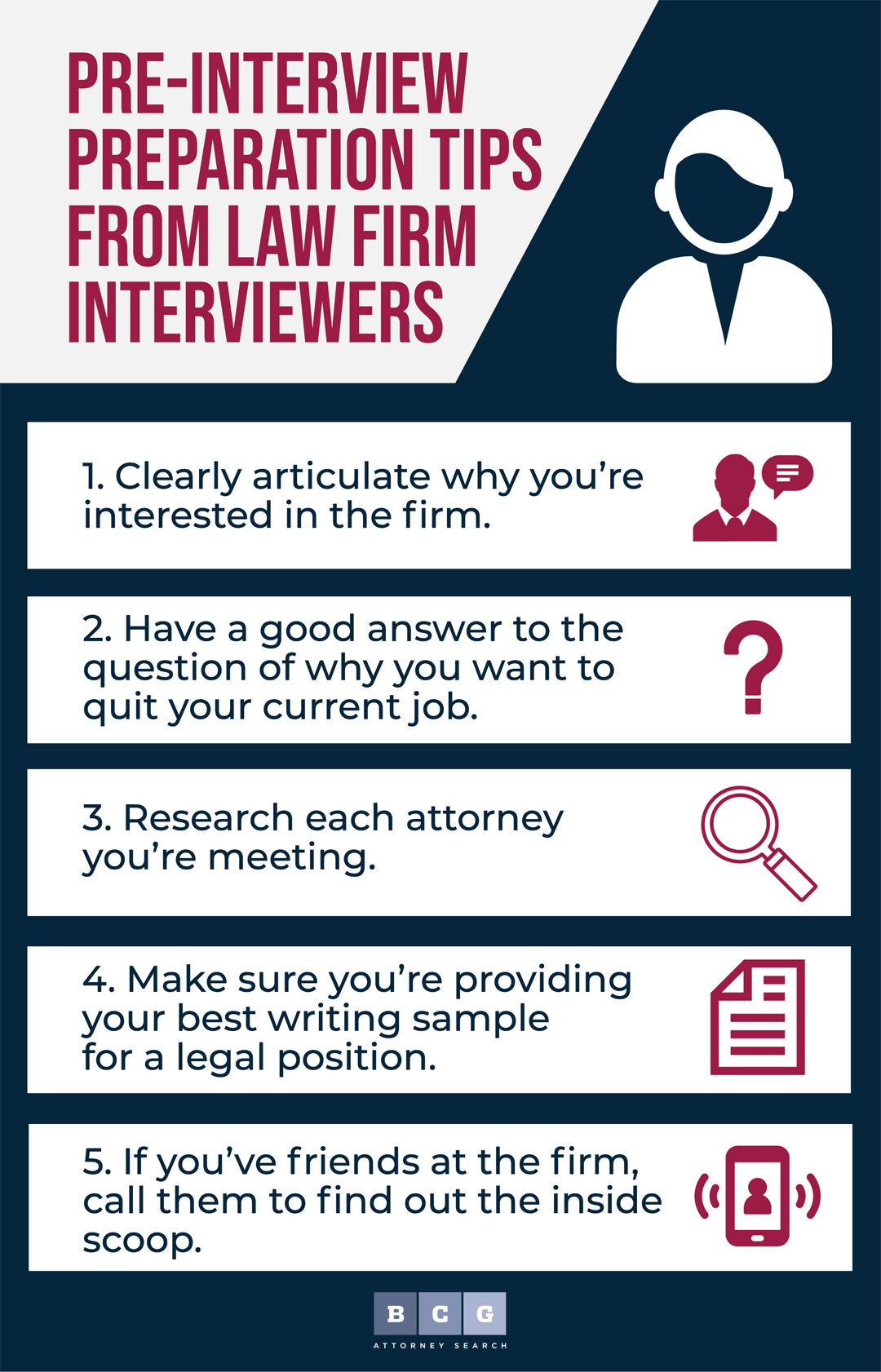
"The most impressive interviewers are those who can clearly articulate why they are interested in our firm, with specific reasons based on research."
“Have a good answer ready when asked why you are seeking to leave your current job.”
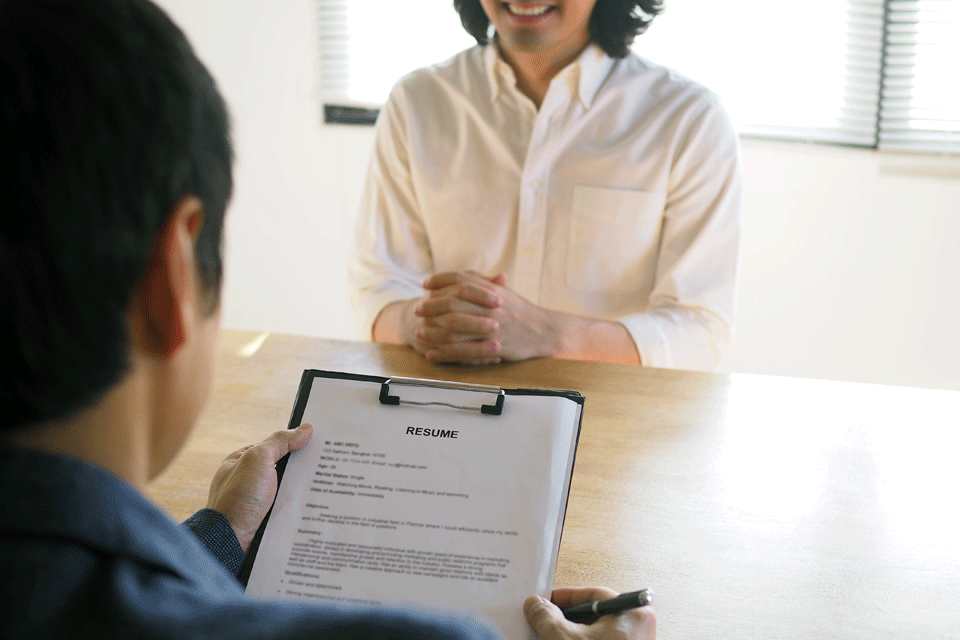
“Before your interview, look at your resume and think of questions you would ask if you were interviewing yourself. Then, have good answers ready for these interview questions.”
“The best attorneys are good researchers. You should research each attorney you are meeting. I will never forget a litigator who took the time to read a recent opinion on which I was listed as the attorney of record. I want them on my team!”
“Do not discount the importance of legal writing samples. Those that review your legal writing take it seriously. Ensure you provide your best possible work and triple-check for typos and Bluebooking.”
“Make sure your writing sample for a legal position does not contain confidential or privileged information. Also, do not unnecessarily redact information that is not confidential or privileged, as this shows you do not know the rules. If in doubt, check the local rules.”
“If you have friends at our firm, call them to find out the inside scoop. They can give you helpful information.”
“Read the recent press releases on our website.”
- These insider tips are enhanced by strategies in Mastering the Solo Practitioner Interview: Strategies for Success, specifically designed for solo practitioner interviews.
FIRST IMPRESSIONS/ETIQUETTE
We have been told since law school that the first impression is the last impression. Law firm interviews can be nerve-wracking for many, and initial excitement can quickly turn into apprehension. You may be nervous before an interview, but there are a few things you can do to ensure you leave a lasting impression! To complement these tips, our video on how showing up affects hiring and advancement provides a practical perspective on standing out during the interview process.- To complement these insider perspectives, the Interview Preparation Guide provides actionable frameworks to prepare for both overt and unspoken signals.
A successful interview requires preparation and planning, and the following tips can help you stand out from the crowd!
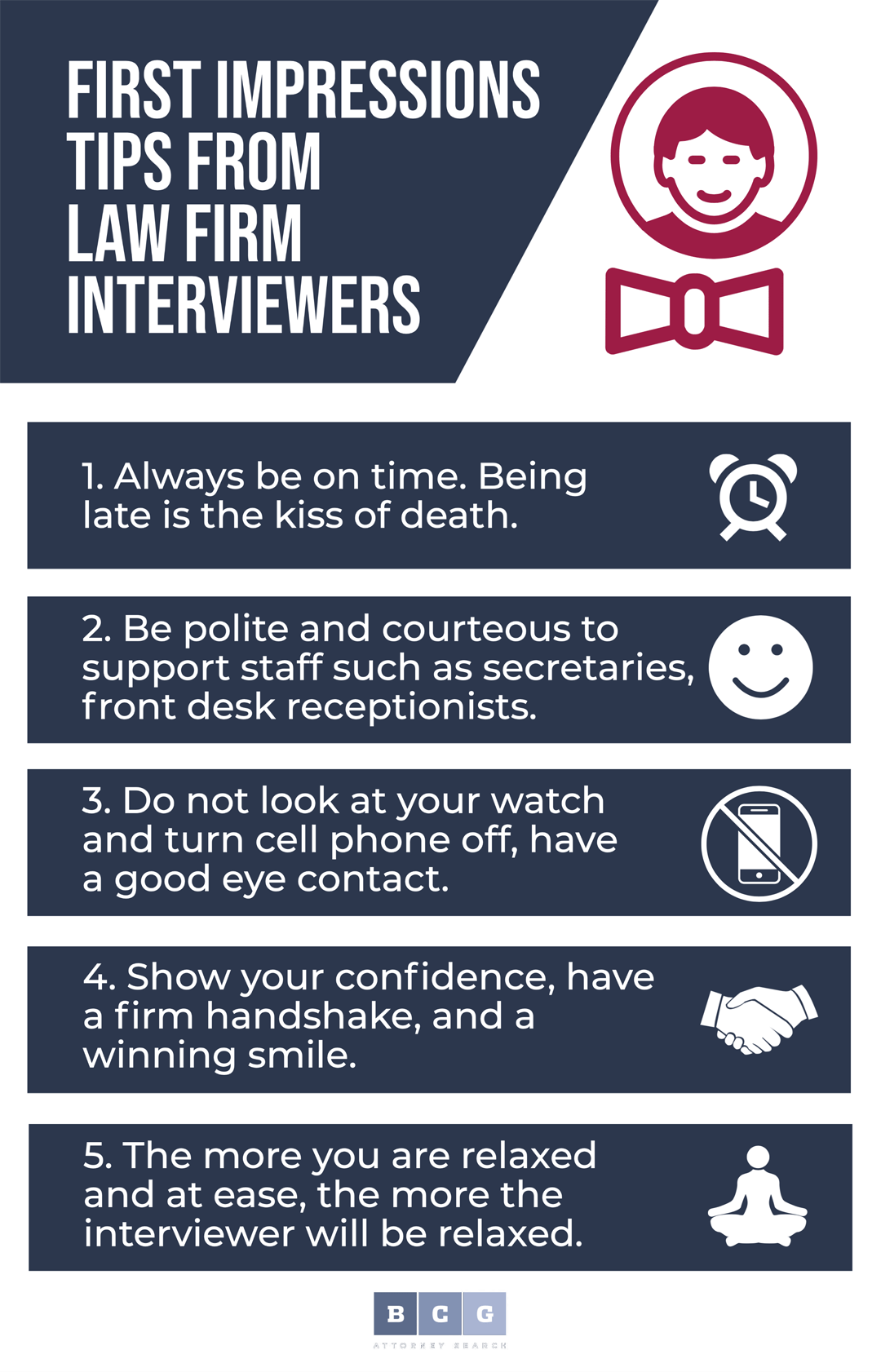
“One of the most important interview tips you will ever get: Being late is the kiss of death. Assume the interview is going to begin 30 minutes before the actual time. Grab a cup of coffee if you arrive early.”
“Be polite and courteous to the support staff such as secretaries, front desk receptionists, etc. They often have the ear of decision-makers and will not hesitate to provide informal feedback on you, especially if you are not respectful.” For a more structured approach to preparation, see Interview Preparation Techniques, which builds on these insider tips.
"Turn the cell phone off. Get a haircut. For men, wear a dark suit, a white/blue shirt, and a red/blue tie. Take off that strange-looking high school ring. No one will appreciate your unique fashion sense. Do not give people something weird to remember you by two months later when they are trying to remember who you are and whether you deserve an offer." Pair these insider tips with our video “21 Major Job Interview Mistakes to Avoid at All Costs” for a clear illustration of what to avoid in real interview scenarios.
Strong interviews are just part of the equation; staying marketable overall requires avoiding career missteps described in Avoid These 10 Common Pitfalls to Stay Marketable as a Lateral Law Firm Attorney.
Interviewers often sense enthusiasm before a single question is asked — a concept reinforced by the ‘Definitive Guide to Why Attorneys Should Accept Every Law Firm Interview,’ where genuine openness to opportunity becomes a differentiating signal.

"Do not look at your watch during an interview, and turn your cell phone off. Good eye contact is key."
"The more you are relaxed, and at ease, the more the interviewer will be relaxed and at ease."
"If your hands tend to get sweaty, keep a handkerchief in your pocket. There is nothing worse than clammy hands."
"A firm handshake and a winning smile are important for both men and women. It is your first chance to show confidence. I have written people off immediately after their limp handshake."
Candidates who master personal branding, as noted in The Kick-Ass Marketing Secret, tend to stand out in interviews.
THE INTERVIEW ITSELF
Partners in law firms ask questions to gauge your knowledge of the specific field, understand how you balance your caseload, and how you interact with clients. Knowing what questions to expect will help you prepare for your interview. You can make a lasting impression on partners by delivering detailed answers, increasing your chances of getting a job offer. Before you apply, it’s helpful to read about The Hidden Job Market for Attorneys, which provides guidance on finding unadvertised roles where interviews often happen off the record.A great starting point is The Elite Boutique Law Firms in the United States.

"Start a conversation with your interviewer before they have a chance to ask a question: Remember to keep it conversational. It is not an interrogation or deposition."
“If you are an associate, focus on impressing the partners but also focus on bonding with the other associates as friends. I do not want to hire somebody who will make me look bad.”
“If you are changing cities, you should be able to show your connection to the new city and your demonstrated interest in living there. For example, how many times have you visited, lived there, etc.”
“It is much better to preemptively explain any weaknesses in your background.”
“If you have received very good performance evaluations, it is your responsibility to make it known to us because we may not want to ask and risk making you feel uncomfortable.” Our On-Campus Interview Master Guide complements these insider tips with actionable examples to impress interviewers.
“Remember that the easiest topic to ask someone (your interviewer) is about themselves—people naturally like to proselytize about their own accomplishments. Ask why we joined this firm, why we like it, etc.”

“You will be asked to talk about your prior experiences, so be prepared to discuss every detail of your job description of your resume.”
“Some of us are not good interviewers, and we get nervous as well. If necessary, it never hurts to take the lead and help carry the job interview with somebody that is not doing the job well.”
“The more we laugh during an interview, and the more we like you personally, the more we will overlook your weaknesses and play up your strengths. It happens all the time.”
“The more the questions relate to the interviewer’s personal experiences—as opposed to administrative-type issues—the better.”
“Be careful with asking questions that show the firm in a negative light. You can ask questions about things that you’re concerned about, for example, a merger or practice group leaving a firm, but balance those questions with questions about things you feel are positive aspects of the firm.”
“Avoid questions that deal with money, vacation, part-time, billable hour minimums, etc. Find this out on our firm’s website or informally.”
“If you do not know the answer to a question, just say, ‘I do not know the answer.’”
“Save your negative-type questions, such as ‘What do you not like about this firm?’ until after you receive an offer. That way, we cannot ding you for being negative.”
“Remember that partners are joint owners in the firm—when someone points out weaknesses in their firm, they take it personally.”
“Associates are more honest when speaking with you outside the office.”
“Do not let your guard down at lunch.”
“Do not feel you need to over-explain things you perceive as weaknesses about yourself. Have an answer ready, but do not go on and on about it.”
“Assume that everything you say to each interviewer will be discussed and compared by each of the interviewers when you are gone and scrutinized for inconsistencies.”
“If an interviewer initiates a debate on a legal issue, do not get too passionate and heated about defending your position. Remain calm, composed, and focus on making logical sense.”
“Realize that the law firm needs you as much as you need them: Don't come across as needy or having low self-esteem.”
“Unlike interviews during law school, remember that the firm needs help because they cannot handle their workload.”
“The more you focus on how your skills and experience can help make our lives easier, the better.”
- See Interviewing Tips for more information.
POST-INTERVIEW
Experienced attorneys with whom you have interviewed vary in their opinions on whether you should send a thank-you note. Thank you emails are not expected to be sent in some parts (e.g., the Northeast). They are more common in other regions (such as the Southeast). Please make sure it is perfect if you decide to send one. It will be viewed as a sample of your writing. To complement these insider tips, How to Get—and Ace—Your Law Firm Summer Associate Interview outlines concrete steps summer associates can take to impress interviewers. To tackle the opening questions confidently, watch our practical video on how attorneys should answer ‘tell me about yourself’.As such, you may choose to send a short follow-up email to individuals with whom you met if: (1) you were very interested in the potential employers and would like to reiterate that interest; (2) you thought you connected with the interviewer and would like to remind the interviewer of your similar interests; or (3) the interviewer went out of their way for you (e.g., treated you to a nice dinner or reception). If you decide to write a follow-up email, you should do so as soon as possible.Interviewers often note that career changers require special framing — check out these second career law interview examples for a model of how to approach those questions. Pair these insider insights with our video The Art of Interviewing to see how to convert behind-the-scenes cues into offers.
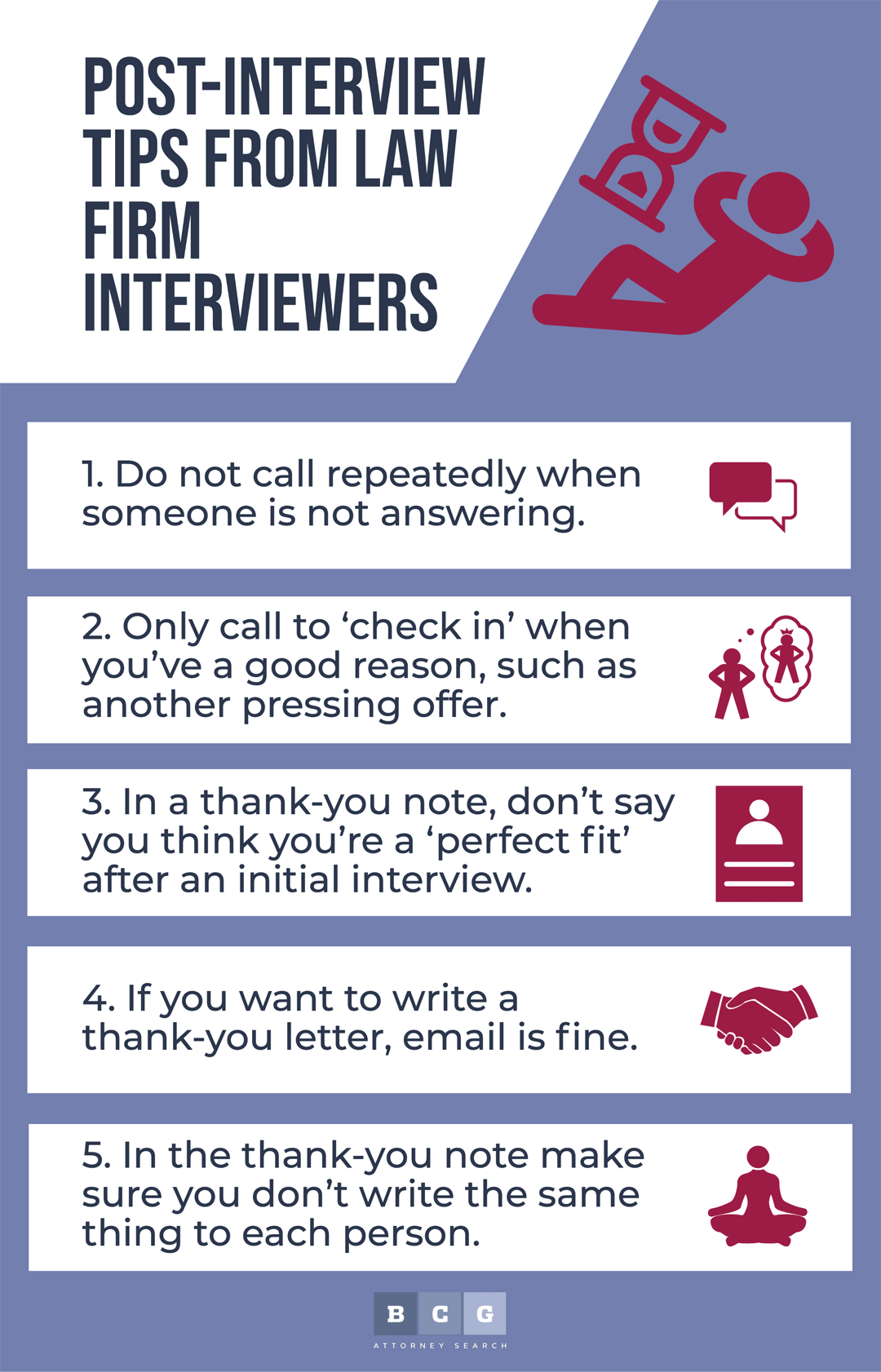
“In regards to post-interview etiquette, I recommend that candidates not repeatedly call when someone is not answering. We have caller ID, and it is ‘stalker-ish’ to see a person call ten times in a row.”
“Do not get too hung up on thank-you notes. If you want to write one, email is fine. Just make sure there are no typos, and you do not write the same thing to each person.”
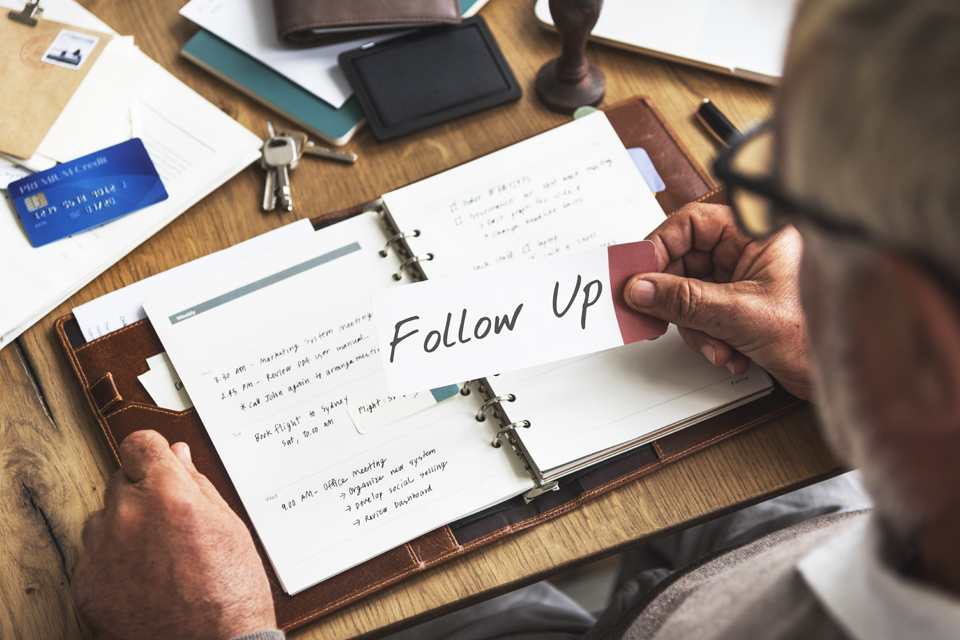
“In a thank-you note, do not say you think you are a ‘perfect fit’ after an initial interview. It is too early, and questions your sincerity.”
“If you are anxious about a possible offer, do not call to ‘check in’ unless you have a good reason for doing so, such as another pressing offer.”
- For attorneys aiming to stand out in their law firm job search, this guide on how to stand out in your law firm job search provides actionable best practices to secure the position you want.
Conclusion
The purpose of law internships is to expose law students to the legal profession. Students learn about the complexities of the legal profession. Nevertheless, the interview process also becomes more difficult as you gain more experience.- Pair these insider tips with structured practice from The Transformative Power of Effective Interview Preparation for Legal Careers to strengthen your interview game even further.
Your chances of getting a job offer increase if you make a great impression and demonstrate your best qualities during an interview. You can impress the hiring team and make them remember you by preparing for the interview and following certain steps afterward.
To complement these behind-the-scenes insights, don’t miss Winning the Interview: Insider Tips from Harrison Barnes, which reveals how candidates can proactively address unspoken interviewer concerns.
- Interviewers often notice mistakes candidates don’t realize they’re making. For a blunt exploration of these errors, see Why Most Attorneys Screw Up Interviews and Their Legal Careers.
Examine tips on how to handle interviews that differ from one-on-one meetings. The list includes tips for phone interviews, second interviews, lunch and dinner interviews, behavioral interviews, interviewing in public, and more advice for interview success. To anticipate the types of questions those interviewers will likely ask, explore the Top 10 Interview Questions During Your Law Firm Interview.
- For a structured overview of questions and answers, check out our common legal interview questions and suggested responses.
The Kick-Ass Marketing Secret,
About Harrison Barnes
No legal recruiter in the United States has placed more attorneys at top law firms across every practice area than Harrison Barnes. His unmatched expertise, industry connections, and proven placement strategies have made him the most influential legal career advisor for attorneys seeking success in Big Law, elite boutiques, mid-sized firms, small firms, firms in the largest and smallest markets, and in over 350 separate practice areas.
A Reach Unlike Any Other Legal Recruiter
Most legal recruiters focus only on placing attorneys in large markets or specific practice areas, but Harrison places attorneys at all levels, in all practice areas, and in all locations-from the most prestigious firms in New York, Los Angeles, and Washington, D.C., to small and mid-sized firms in rural markets. Every week, he successfully places attorneys not only in high-demand practice areas like corporate and litigation but also in niche and less commonly recruited areas such as:
- Immigration Law
- Workers Compensation
- Insurance
- Family Law
- Trust and Estate
- Municipal law
- And many more...
This breadth of placements is unheard of in the legal recruiting industry and is a testament to his extraordinary ability to connect attorneys with the right firms, regardless of market size or practice area.
Proven Success at All Levels
With over 25 years of experience, Harrison has successfully placed attorneys at over 1,000 law firms, including:
- Top Am Law 100 firms such including Sullivan and Cromwell, and almost every AmLaw 100 and AmLaw 200 law firm.
- Elite boutique firms with specialized practices
- Mid-sized firms looking to expand their practice areas
- Growing firms in small and rural markets
He has also placed hundreds of law firm partners and has worked on firm and practice area mergers, helping law firms strategically grow their teams.
Unmatched Commitment to Attorney Success - The Story of BCG Attorney Search
Harrison Barnes is not just the most effective legal recruiter in the country, he is also the founder of BCG Attorney Search, a recruiting powerhouse that has helped thousands of attorneys transform their careers. His vision for BCG goes beyond just job placement; it is built on a mission to provide attorneys with opportunities they would never have access to otherwise. Unlike traditional recruiting firms, BCG Attorney Search operates as a career partner, not just a placement service. The firm's unparalleled resources, including a team of over 150 employees, enable it to offer customized job searches, direct outreach to firms, and market intelligence that no other legal recruiting service provides. Attorneys working with Harrison and BCG gain access to hidden opportunities, real-time insights on firm hiring trends, and guidance from a team that truly understands the legal market. You can read more about how BCG Attorney Search revolutionizes legal recruiting here: The Story of BCG Attorney Search and What We Do for You.
The Most Trusted Career Advisor for Attorneys
Harrison's legal career insights are the most widely followed in the profession.
- His articles on BCG Search alone are read by over 150,000 attorneys per month, making his guidance the most sought-after in the legal field. Read his latest insights here.
- He has conducted hundreds of hours of career development webinars, available here: Harrison Barnes Webinar Replays.
- His placement success is unmatched-see examples here: Harrison Barnes' Attorney Placements.
- He has created numerous comprehensive career development courses, including BigLaw Breakthrough, designed to help attorneys land positions at elite law firms.
Submit Your Resume to Work with Harrison Barnes
If you are serious about advancing your legal career and want access to the most sought-after law firm opportunities, Harrison Barnes is the most powerful recruiter to have on your side.
Submit your resume today to start working with him: Submit Resume Here
With an unmatched track record of success, a vast team of over 150 dedicated employees, and a reach into every market and practice area, Harrison Barnes is the recruiter who makes career transformations happen and has the talent and resources behind him to make this happen.
A Relentless Commitment to Attorney Success
Unlike most recruiters who work with only a narrow subset of attorneys, Harrison Barnes works with lawyers at all stages of their careers, from junior associates to senior partners, in every practice area imaginable. His placements are not limited to only those with "elite" credentials-he has helped thousands of attorneys, including those who thought it was impossible to move firms, find their next great opportunity.
Harrison's work is backed by a team of over 150 professionals who work around the clock to uncover hidden job opportunities at law firms across the country. His team:
- Finds and creates job openings that aren't publicly listed, giving attorneys access to exclusive opportunities.
- Works closely with candidates to ensure their resumes and applications stand out.
- Provides ongoing guidance and career coaching to help attorneys navigate interviews, negotiations, and transitions successfully.
This level of dedicated support is unmatched in the legal recruiting industry.
A Legal Recruiter Who Changes Lives
Harrison believes that every attorney-no matter their background, law school, or previous experience-has the potential to find success in the right law firm environment. Many attorneys come to him feeling stuck in their careers, underpaid, or unsure of their next steps. Through his unique ability to identify the right opportunities, he helps attorneys transform their careers in ways they never thought possible.
He has worked with:
- Attorneys making below-market salaries who went on to double or triple their earnings at new firms.
- Senior attorneys who believed they were "too experienced" to make a move and found better roles with firms eager for their expertise.
- Attorneys in small or remote markets who assumed they had no options-only to be placed at strong firms they never knew existed.
- Partners looking for a better platform or more autonomy who successfully transitioned to firms where they could grow their practice.
For attorneys who think their options are limited, Harrison Barnes has proven time and time again that opportunities exist-often in places they never expected.
Submit Your Resume Today - Start Your Career Transformation
If you want to explore new career opportunities, Harrison Barnes and BCG Attorney Search are your best resources. Whether you are looking for a BigLaw position, a boutique firm, or a move to a better work environment, Harrison's expertise will help you take control of your future.
Submit Your Resume Here to get started with Harrison Barnes today.
Harrison's reach, experience, and proven results make him the best legal recruiter in the industry. Don't settle for an average recruiter-work with the one who has changed the careers of thousands of attorneys and can do the same for you.
About BCG Attorney Search
BCG Attorney Search matches attorneys and law firms with unparalleled expertise and drive, while achieving results. Known globally for its success in locating and placing attorneys in law firms of all sizes, BCG Attorney Search has placed thousands of attorneys in law firms in thousands of different law firms around the country. Unlike other legal placement firms, BCG Attorney Search brings massive resources of over 150 employees to its placement efforts locating positions and opportunities its competitors simply cannot. Every legal recruiter at BCG Attorney Search is a former successful attorney who attended a top law school, worked in top law firms and brought massive drive and commitment to their work. BCG Attorney Search legal recruiters take your legal career seriously and understand attorneys. For more information, please visit www.BCGSearch.com.
Harrison Barnes does a weekly free webinar with live Q&A for attorneys and law students each Wednesday at 10:00 am PST. You can attend anonymously and ask questions about your career, this article, or any other legal career-related topics. You can sign up for the weekly webinar here: Register on Zoom
Harrison also does a weekly free webinar with live Q&A for law firms, companies, and others who hire attorneys each Wednesday at 10:00 am PST. You can sign up for the weekly webinar here: Register on Zoom
You can browse a list of past webinars here: Webinar Replays
You can also listen to Harrison Barnes Podcasts here: Attorney Career Advice Podcasts
You can also read Harrison Barnes' articles and books here: Harrison's Perspectives
Harrison Barnes is the legal profession's mentor and may be the only person in your legal career who will tell you why you are not reaching your full potential and what you really need to do to grow as an attorney--regardless of how much it hurts. If you prefer truth to stagnation, growth to comfort, and actionable ideas instead of fluffy concepts, you and Harrison will get along just fine. If, however, you want to stay where you are, talk about your past successes, and feel comfortable, Harrison is not for you.
Truly great mentors are like parents, doctors, therapists, spiritual figures, and others because in order to help you they need to expose you to pain and expose your weaknesses. But suppose you act on the advice and pain created by a mentor. In that case, you will become better: a better attorney, better employees, a better boss, know where you are going, and appreciate where you have been--you will hopefully also become a happier and better person. As you learn from Harrison, he hopes he will become your mentor.
To read more career and life advice articles visit Harrison's personal blog.






